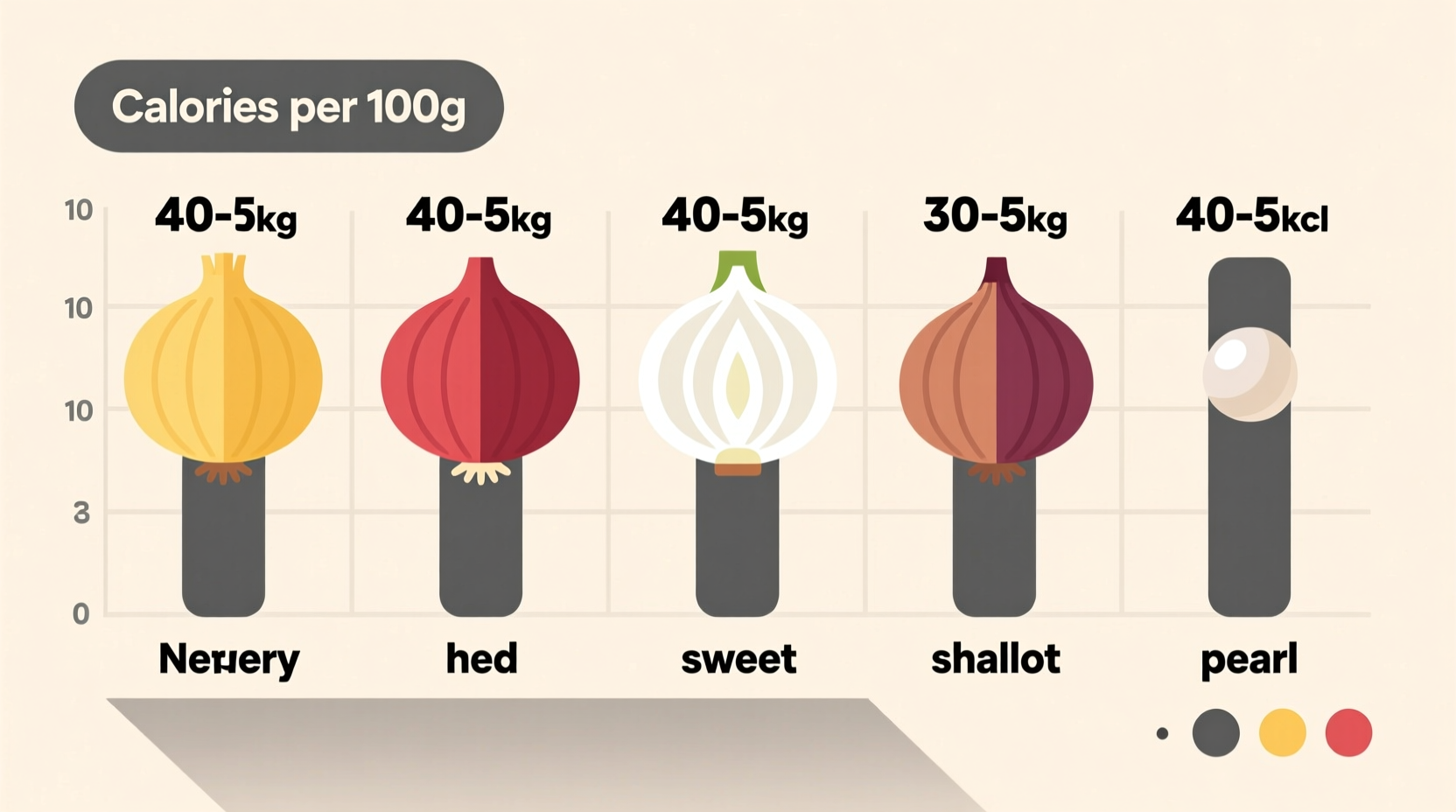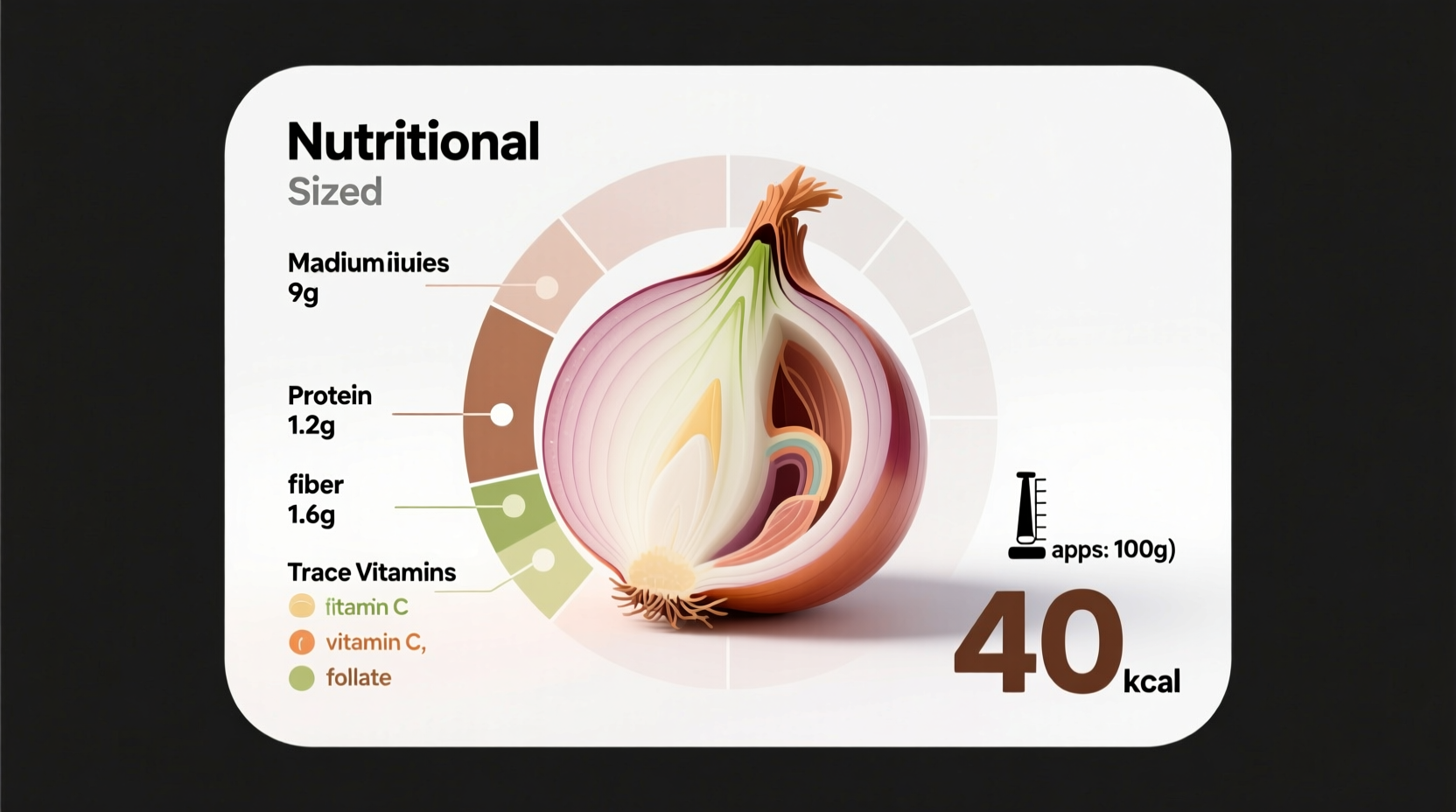Understanding the precise nutritional profile of common ingredients is essential for informed dietary choices. Onions, a kitchen staple worldwide, offer remarkable flavor with minimal caloric impact. Whether you're meal planning, managing weight, or simply curious about your food, knowing exactly how many calories are in an onion helps you make smarter culinary decisions.
Exact Calorie Counts by Onion Type
Not all onions are created equal when it comes to nutritional content. The USDA FoodData Central database provides precise measurements for different onion varieties. The following table shows calorie information per 100-gram serving, which represents approximately one small onion:
| Onion Type | Calories (per 100g) | Carbohydrates (g) | Dietary Fiber (g) |
|---|---|---|---|
| Yellow Onion (most common) | 40 | 9.3 | 1.7 |
| Red Onion | 40 | 9.5 | 1.8 |
| White Onion | 43 | 10.0 | 1.9 |
| Green Onions (Scallions) | 32 | 7.3 | 2.6 |
| Shallot | 72 | 16.8 | 3.2 |
This comparative data comes directly from the USDA FoodData Central, the most authoritative source for nutritional information in the United States. Notice that shallots contain significantly more calories than other onion varieties due to their higher carbohydrate density.
Practical Calorie Measurements for Real Cooking
When planning meals, you'll need to know calorie counts for actual serving sizes rather than laboratory measurements. Here's what you'll encounter in everyday cooking:
- Medium onion (110g): 44 calories - perfect for one serving in most recipes
- Large onion (170g): 68 calories - common in restaurant portions
- 1 cup chopped onion (160g): 64 calories - useful for recipe scaling
- 1 tablespoon raw onion (16g): 6 calories - relevant for garnishes

Nutritional Benefits Beyond Calories
Onions deliver impressive nutritional value far beyond their minimal calorie count. A medium onion provides:
- Vitamin C: 11% of your daily recommended intake - crucial for immune function
- Vitamin B6: 7% of daily needs - supports metabolism and brain health
- Manganese: 6% of daily value - important for bone health and metabolism
- Folate: 5% of daily requirement - essential for cell function and tissue growth
- Antioxidants: Particularly quercetin, which has anti-inflammatory properties
Research published in the Journal of Food Science and Technology confirms that onions contain numerous phytochemicals with potential health benefits, including compounds that may support heart health and blood sugar regulation.
How Cooking Affects Onion Calories
Many people wonder whether cooking changes the calorie content of onions. The truth is straightforward: raw versus cooked onions contain virtually identical calories. However, cooking does impact volume and perceived quantity:
- Raw onions: Maintain their full volume and crisp texture
- Sautéed onions: Reduce to about 50% of original volume but maintain similar calorie density
- Caramelized onions: Reduce to approximately 20% of original volume, concentrating flavors but not calories
When caramelizing onions, the common misconception is that added sugar increases calorie count. In reality, proper caramelization uses only the onion's natural sugars, with no additional calories beyond what's naturally present. The process simply breaks down complex carbohydrates into simpler, sweeter compounds.
Onions in Meal Planning and Weight Management
With their low calorie density and high water content (89% water), onions are an excellent addition to weight management diets. Registered dietitians frequently recommend onions because:
- They add significant flavor without adding meaningful calories
- Their fiber content (1.7g per medium onion) promotes satiety
- They enhance vegetable-based dishes, making healthy eating more enjoyable
- They provide natural sweetness that can reduce the need for added sugars
A study from the Centers for Disease Control and Prevention notes that incorporating low-calorie, high-volume foods like onions helps people feel satisfied while consuming fewer calories overall - a key strategy for sustainable weight management.
Common Misconceptions About Onion Calories
Several myths persist about onion nutrition that deserve clarification:
- "Onions are high in sugar": While onions contain natural sugars (about 4.2g per 100g), this is comparable to many non-starchy vegetables and significantly less than fruits.
- "Cooking adds calories": The cooking process itself doesn't increase calories, though added fats (oil, butter) do contribute additional calories.
- "All onions have the same nutritional value": As shown in our comparison table, different varieties have slightly different nutritional profiles.
- "Onions cause weight gain": With only 44 calories per medium onion, they're extremely unlikely to contribute to weight gain when consumed in normal culinary amounts.
Practical Usage Tips for Health-Conscious Cooking
Maximize the nutritional benefits of onions with these chef-tested techniques:
- Use raw onions in salads: Preserves maximum vitamin C content, which diminishes with cooking
- Let chopped onions sit for 10 minutes before cooking: Enhances the formation of beneficial compounds
- Pair with healthy fats: The fat-soluble antioxidants in onions absorb better when combined with olive oil or avocado
- Don't discard onion skins: While not edible, they contain concentrated antioxidants useful for making vegetable stock
- Measure before chopping: For precise calorie counting, weigh onions before preparation as volume changes significantly











 浙公网安备
33010002000092号
浙公网安备
33010002000092号 浙B2-20120091-4
浙B2-20120091-4